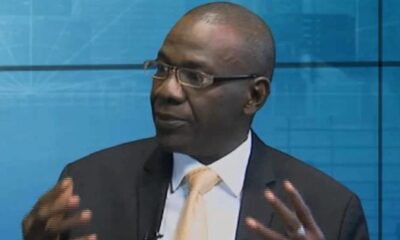Money market
BDC operators decry CBN exchange rate policy
By Sodiq Adelakun
Bureau De Change operators in Nigeria have decried the Central Bank of Nigeria’s (CBN) exchange rate policy.
Recall that the CBN announced the unification of all segments of Nigeria’s foreign exchange market, consolidating all windows into one On June 14, 2023.
This action was part of a series of immediate changes aimed at improving liquidity and stability in the Nigerian Foreign Exchange (FX) Market.
Under this directive, commercial banks were given permission to remove the rate cap on the naira at the Investors and Exporters (I&E) window of the foreign exchange market, allowing for a free float of the naira against the dollar and other global currencies.
The CBN’s decision to float the currency and unify the country’s multiple exchange rates has been praised by the organised private sector, financial experts, and economists.
They believe this move will bring transparency and stability to the forex market, as well as attract more foreign investment and capital inflow into the economy.
However, Bureau de Change operators, also known as BDC forex dealers, have expressed dissatisfaction with the CBN’s decision to abolish segments of the official forex market in favour of the I&E window, where the “willing buyer and willing seller” approach was reintroduced.
These operators argue that the CBN should collaborate with them, considering that they play a critical role in addressing the retail end of the market and ensuring exchange rate stability in the country’s economy.
The President of the Association of Bureau De Change Operators of Nigeria (ABCON), Aminu Gwadebe, stated that despite the new exchange rate policy by the CBN, the foreign exchange market remains volatile because BDCs are excluded from the I&E window.
‘’The volatility of the naira continues to underpin the slow economic growth of Nigeria. The I&E window is laudable, it’s patriotic and nationalistic, but there is no policy that can actualise its mission without carrying the interest of the subsector (which is the BDCs). The I&E window is supposed to run on three legs, the banks, the CBN and the BDCs, overtly or covertly, the BDCs are missing.”
Gwadebe highlighted the high exchange rate disparity of about N30 between the I&E window and the parallel market, as the apex bank has yet to adequately address the retail end of the market that is primarily served by BDCs.
He emphasised that this has negatively affected liquidity in the foreign exchange market.
The ABCON President added, “the forex market is not competitive because of the limited number of participants. The other one is the issue of liquidity and then legislation with respect to the FMDQ.
“The legislation is expected to allow participants, including the BDCs, to be part of the forex market.
“We are talking about sustainability now and that market (forex market) will drive sustainability in terms of inflow to address liquidity issues. Fortunately or unfortunately, the banks are even now formalising Bureau De Change or do I say parallel market operations.”
Gwadebe suggested that a legal and regulatory framework for the forex market should be established to supervise and manage the market.
He called for legislation to support the existing policies and strengthen the operations of FMDQ, which manages the forex market.
Another BDC operator argued that the new exchange rate policy has not significantly affected their business, stating that it is a mixed situation.
They mentioned that foreign exchange users still patronise them since commercial banks sometimes sell at higher rates and may not have sufficient funds.
Therefore, they do not see a pressing need to be part of the I&E window since BDCs already source their funds from autonomous sources.
Overall, BDC operators are urging a more inclusive approach in the foreign exchange market and seeking legislative support to enhance liquidity, competitiveness, and sustainability in the market.
Money market
Lagos, India to boost trade partnership


The Lagos Chamber of Commerce and Industry and the Confederation of Indian Industry have signed an agreement to boost trade partnership.
In a memorandum of understanding in Lagos on Tuesday, both parties observed that the agreement would enhance avenues for effective collaborations.
Lagos Chamber of Commerce and Industry Deputy President Knut Ulvmoen said that the partnership’s focus was to leverage the trade capacity of both parties.
Ulvmoen said that both parties would explore capacity in Information and Communication Technology, medical, training, agriculture, manufacturing and export, among others.
He acknowledged what he described as robust and enduring trade relations between Nigeria and India.
He noted that over the years, both nations had witnessed a steady growth in bilateral trade with significant contributions from various sectors.
“Today’s meeting serves as a platform to, not only strengthen the existing partnerships, but also to forge new alliances that will contribute to the sustainable growth and development of both nations.
“Together, we must seize this moment to identify synergies, exchange expertise, and explore innovative solutions to economic challenges.
“Let us leverage the collective wisdom of our industries to develop actionable strategies that will drive inclusive growth, foster entrepreneurship, and enhance competitiveness,” he said.
Indian High Commissioner Shri Balasubramanian expressed his belief in shared growth and prosperity by both countries.
He also emphasised the importance of Nigerian-Indian business collaboration.
Balasubramanian stated that the government of India was making efforts to build capacity in trade, seeking private sectors’ partnership to identify projects that could be profitable to the trade structure of both countries.
“The opportunities existing between both countries are enormous as more than 155 Indian companies in Nigeria employ many Nigerians.
“From oil to steel; to healthcare, we are willing to link Nigerians up with their counterparts in India as we explore avenues of collaboration and partnership,” he said.
Money market
Naira remains at N1,350 as CBN targets FX inflow for liquidity boost


The naira on Tuesday steadied at 1,350 per US dollar on the parallel market, popularly called black market.
On Monday morning, the naira opened the foreign exchange (FX) market at the same rate before closing at N1,360/$1 on the same day at the black market.
At the official market known as the Nigerian Autonomous Foreign Exchange Market (NAFEM), the naira on Monday fell to 1,419.11 per dollar, the lowest since March 13, 2024 at the official FX market, following slowing inflows occasioned by the withdrawal of funds by Foreign Portfolio Investors (FPIs).
The intraday high closed at N1,451 per dollar on Monday, weaker than N1,410 closed on Friday. The intraday low also depreciated marginally to N1,060 on Monday as against N1,051/$1 closed on Friday at NAFEM, data from the FMDQ Securities Exchange indicated.
Dollars supplied by willing buyers and willing sellers declined by 52.16 percent to $147.83 million on Monday from $309.01 million recorded on Friday.
On day to day trading, the naira weakened by 5.63 percent as the dollar was quoted at N1,419.11 on Monday as against N1,339.23 quoted on Friday at NAFEM.
During the recent Monetary Policy Committee (MPC) meeting, Governor of the Central Bank of Nigeria (CBN), Olayemi Cardoso, emphasised the critical need to attract inflows to maintain liquidity in the foreign exchange market and stabilize the exchange rate.
In his statement, Governor Cardoso highlighted the importance of addressing inflationary pressures through exchange rate management to safeguard both price stability and long-term economic growth.
“Failure to tame inflationary pressure using the exchange rate channel may jeopardise not only price stability but also long-term growth,” stated Governor Cardoso.
Addressing concerns raised at the March 2024 MPC meeting, Governor Cardoso emphasised the need to reduce negative real interest rates to attract capital flows and enhance liquidity in the FX market. He stressed the significance of attracting capital flows through foreign portfolio investments and moderating exchange rate pressures to mitigate the impact of exchange rate pass-through on inflation, particularly in Nigeria’s import-dependent economy.
Commenting on the monetary situation, Mustapha Akinkunmi highlighted a decline in Nigeria’s reserve money by 24.91 percent to approximately N22.2 trillion by the end of February 2024. Despite this, broad money (M3) supply increased to N93.7 trillion, contributing to inflationary pressures. Nigeria’s external reserves also decreased to US$32.87 billion as of March 19, 2024, from US$33.68 billion in February 2024.
Although current reserves cover imports for 5.7 months of goods only and 4.5 months of goods and services, the country’s ability to repay short-term debts using reserves exceeded the threshold at 104.0 percent, he said.
According to him, the reserves-to-broad money ratio of 33.1 percent surpassed the 20.0 percent threshold, indicating Nigeria’s capacity to manage capital flows effectively.
Governor Cardoso’s emphasis on attracting inflows and managing exchange rate pressures underscores the CBN’s commitment to maintaining stability in the FX market and combating inflationary challenges in Nigeria’s economy.
Money market
Mobile channel most vulnerable, as financial institutions lose N17.67bn to fraudsters in 2023


Latest report by the Nigeria Inter-Bank Settlement System (NIBSS) on Annual Fraud Landscape (January to December 2023) has revealed that commercial banks, Point of Sales (PoS) operators and others lost about N17.67 billion to fraudsters in 2023.
The report published on its website on Monday identified mobile channels as the most vulnerable avenue for fraudsters notably Web and POS businesses.
The report noted that fraud perpetrated via mobile channels increased by five percent compared to the previous year.
It also suggested some of the regulations inputted to check fraud in financial institutions need detailed examination, modification and reinforcement.
According to the statistics revealed by the report, fraud count dropped by six percent to 95,620, as actual loss from fraud grew by 23 percent in 2023 when compared to 2022 with the first quarter being the month with the highest fraud volume in 2023 and the fourth quarter being the month with the highest fraud value.
It also disclosed that the month of May recorded the highest fraud count of 11,716, followed by February with 9,492 while October saw the highest actual loss in 2023 at N3.7 billion, followed by January with N2.7 billion. It said the count of Web Fraud decreased by 38 percent and ATM fraud recorded a 64 percent reduction from 2022 to 2023.
Also, in 2023, people aged 40 and above remained the primary targets of fraudsters, which NIBSS said signified a persistent focus on the targeting strategy of fraudsters.
“This sustained trend emphasises the enduring appeal of the demographic group as potential victims, reinforcing the need for continuous efforts to educate and protect individuals in this category from fraudulent activities,” NIBSS said.
In 2023, a total of 80,658 unique customers fell for the gimmicks of fraudsters which is four per cent less than 84,130 customers recorded in the previous year.
“This decline, though apparent, does not diminish the severity of the issue, urging the financial industry to remain vigilant, enhance security measures and collaboratively address the tenacious challenges posed by fraud,” it said.
-
capital market2 years ago
Rt.briscoe, FBNH, Others halts negative performance of stock market
-
Finance3 months ago
Court orders Sen. Victor Umeh to repay N136m bank debt to AMCON
-



 Abuja Update2 months ago
Abuja Update2 months agoUNDP, FG partnership needed to achieve inclusion, equity- Minister
-
Abuja Update1 month ago
Banks drive stock market performance with N147bn gain
-



 Business2 weeks ago
Business2 weeks agoTingo Group unveils Tingo Electric, Tingo Cola drink at Lagos launch
-



 Health3 weeks ago
Health3 weeks agoCapacity training will reduce migration of health workers- NPHCDA
-
News4 months ago
Oil thieves sponsoring malicious media campaign against Navy – Spokesman
-



 Infotech1 month ago
Infotech1 month agoWorld Backup Day: NITDA urges Nigerians to ensure backup of data









